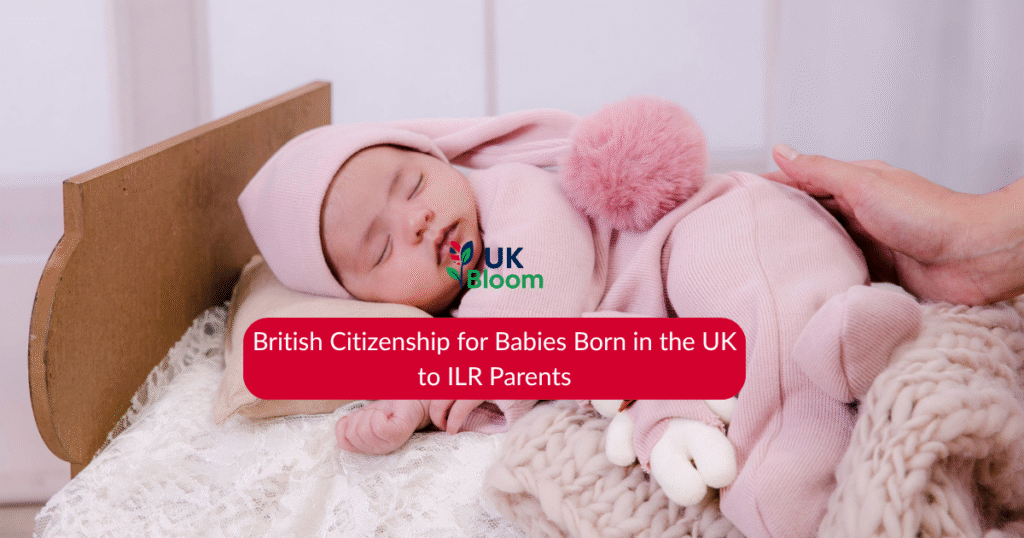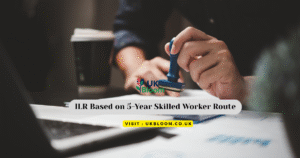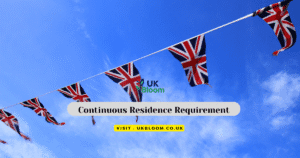Babies Born in the UK,
When both parents hold Indefinite Leave to Remain (ILR) in the UK and welcome a child, the child’s nationality status becomes a critical concern. In this complete guide, we explore every aspect of how British citizenship applies to babies born under these circumstances, including eligibility criteria, registration steps, passport application, associated costs, and what to do if the child is born abroad.
Understanding British Citizenship for UK-Born Babies
Who Qualifies as a British Citizen at Birth?
Under the British Nationality Act 1981, a child born in the UK automatically becomes a British citizen at birth if, at the time of their birth, at least one parent is:
- A British citizen, or
- Settled in the UK (holding ILR, EU Settled Status, or Permanent Residence)
Therefore, if both parents hold Indefinite Leave to Remain, the baby will automatically be a British citizen, provided they are born in the UK.
Table of Contents
Key Benefits of Citizenship at Birth
- No need to apply for ILR for the child
- Free access to education and the NHS
- Eligible for a British passport immediately
- Full rights to live, work, and remain in the UK for life
Step-by-Step: What to Do After the Baby is Born in the UK
1. Register the Birth
- When: Within 42 days of the child’s birth
- Where: At your local register office
- What You’ll Need:
- Baby’s birth details
- Parent(s)’ proof of ID and immigration status (ILR BRP cards or Home Office letters)
More info: Register a birth in England and Wales
2. Apply for a British Passport
Once the child’s birth is registered, you can apply for a British child passport.
Required Documents:
- Birth certificate
- Both parents’ BRPs or passports showing ILR status
- Completed passport application (online or paper)
- A passport photo of the child
- A countersignatory (for first passports)
Cost of a UK Child Passport in 2025:
| Application Method | Price | Processing Time |
|---|---|---|
| Online | £53.50 | ~3 weeks |
| Paper Form | £64.00 | ~3 weeks |
| 1-week Fast Track | £122 | 1 week |
| Premium (same-day) | Not available for children | N/A |
Apply online: UK Passport Application
Supporting Evidence of ILR Status for Parents
You must prove both parents had settled status (ILR) at the time of the child’s birth. Acceptable documents include:
- Biometric Residence Permit (BRP) showing “Indefinite Leave to Remain”
- Home Office decision letters
- Naturalisation certificates (if applicable)
What If the Baby Is Born Abroad?
If both parents have ILR but the baby is born outside the UK, the child is not automatically a British citizen. You must:
- Apply to register the child as a British citizen (under Section 3(1) of the British Nationality Act)
- Provide evidence of parents’ settled status and residence
- Pay a registration fee of £1,214 (as of 2025)
- Once registered, apply for a British passport
More details: Register as a British citizen
Common Scenarios and Outcomes
✅ Baby born in the UK – both parents have ILR at birth
→ Child is automatically a British citizen
✅ Baby born in the UK – one parent has ILR
→ Child is still automatically a British citizen
✅ Baby born in the UK before parents got ILR
→ Child is not British at birth but can be registered as a citizen later
✅ Baby born abroad – both parents have ILR
→ Child is not automatically British but can be registered
Passport Application Rejections: Common Mistakes
- Missing proof of ILR at the time of birth
- Incorrect birth certificate type (must be full version showing parents’ names)
- No countersignature
- Using an outdated or unaccepted passport photo
Double-check your application to avoid delays or rejection.
Dual Nationality Considerations
If the parents hold another nationality and the child gains British citizenship at birth:
- The child may automatically acquire dual nationality
- Some countries do not permit dual citizenship—check with your embassy
- The UK allows dual nationality without restriction
What Happens If ILR Is Granted After Birth?
If the parents receive ILR after the baby is born, the child is not automatically British, but you may:
- Apply to register the child as a British citizen (Form MN1)
- Pay the applicable fee (£1,214)
- Provide proof of parents’ ILR and child’s birth in the UK
Internal Navigation: Related UKBloom Resources
- Indefinite Leave to Remain (ILR) – Full Guide
- British Citizenship by Naturalisation
- How to Apply for a UK Passport
- Registering Children as British Citizens
External Resources
Visual Guide: British Citizenship at Birth – ILR Parents
| Situation | Born in UK | British at Birth? | Action Required |
|---|---|---|---|
| Both parents have ILR before birth | ✅ | ✅ Yes | Apply for passport only |
| One parent has ILR before birth | ✅ | ✅ Yes | Apply for passport only |
| Parents get ILR after baby is born | ✅ | ❌ No | Register child using Form MN1 |
| Baby born abroad, parents have ILR | ❌ | ❌ No | Register as British then apply |
| Both parents are British citizens | ✅ | ✅ Yes | Apply for passport only |
FAQs
Do I need to apply for citizenship for a baby born in the UK to ILR parents?
No. The child is automatically British at birth if at least one parent had ILR when the baby was born.
How long does a child passport take?
Standard applications take about 3 weeks, but faster options are available for urgent travel.
Can I travel with my baby without a passport?
No. Even newborns need their own passport to travel internationally.
Is it better to register or naturalise a child?
If eligible, automatic citizenship at birth is best. Registration is required only when the child is not automatically British.
Final Thoughts
Securing your child’s British citizenship from birth is straightforward when both parents have ILR. It provides them with lifelong rights and access to all the benefits of being a British citizen. Applying early for a passport ensures no delays in travel, documentation, or identity recognition. For families building a future in the UK, this is one of the most secure and advantageous legal statuses a child can receive.
Disclaimer
This article is for informational purposes only. Immigration laws may change. For the most accurate and up-to-date advice, consult an immigration solicitor or visit gov.uk.






